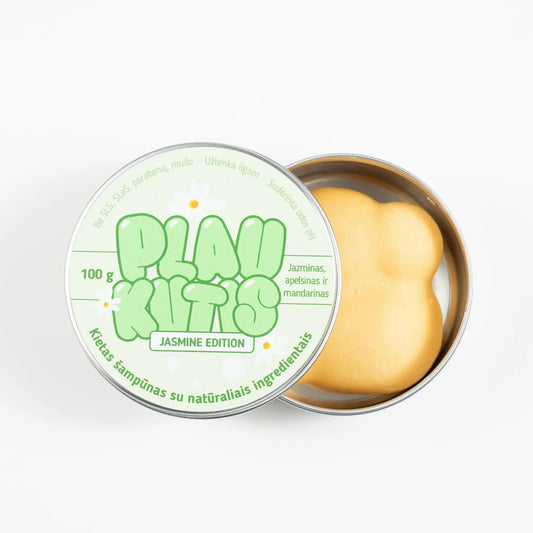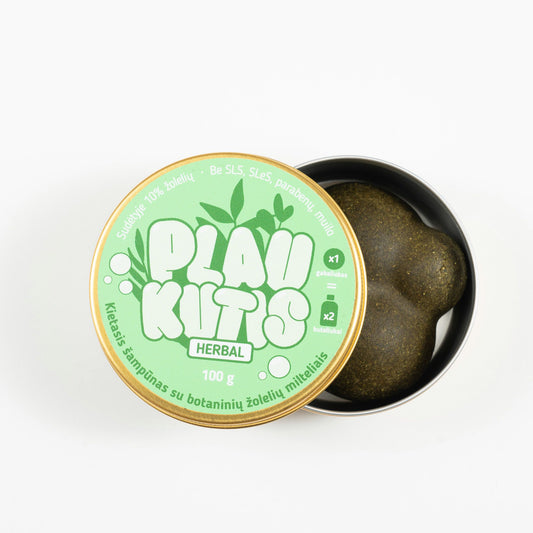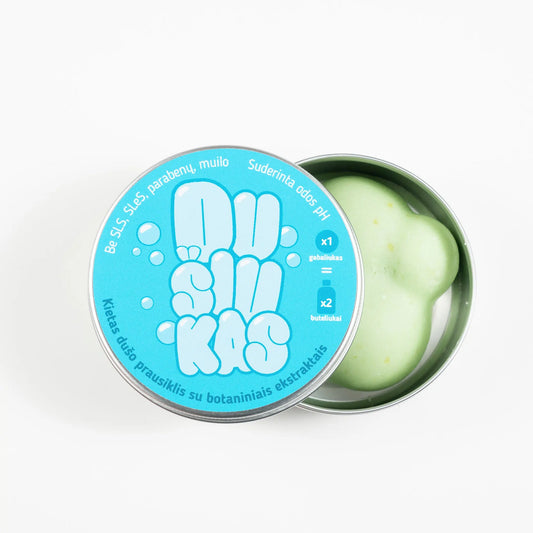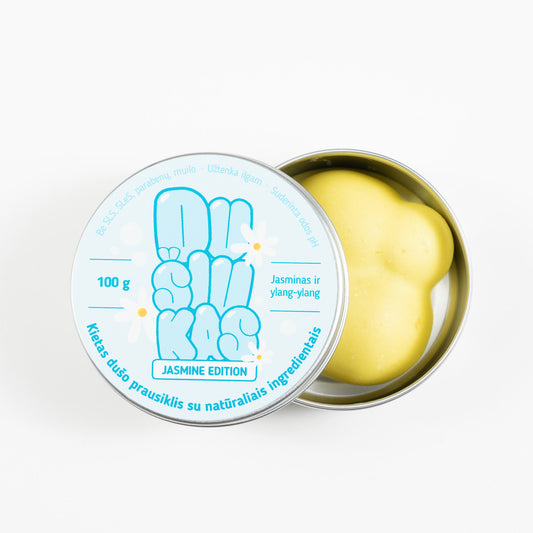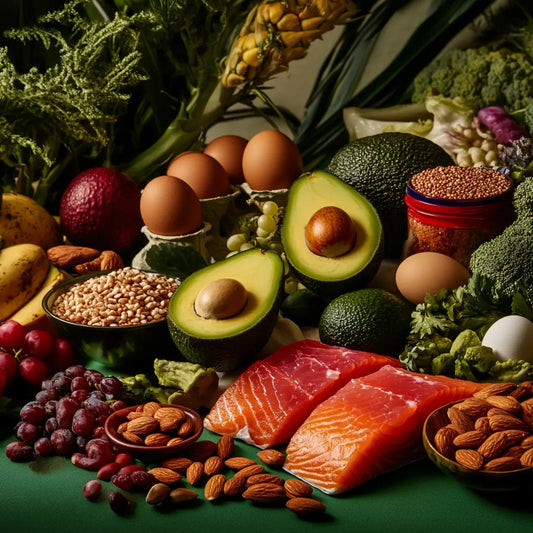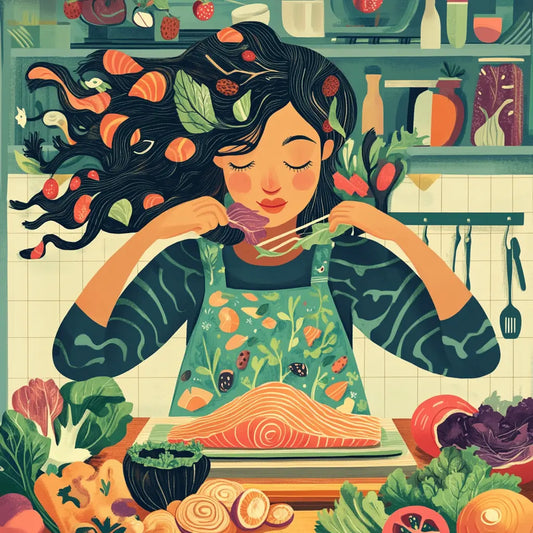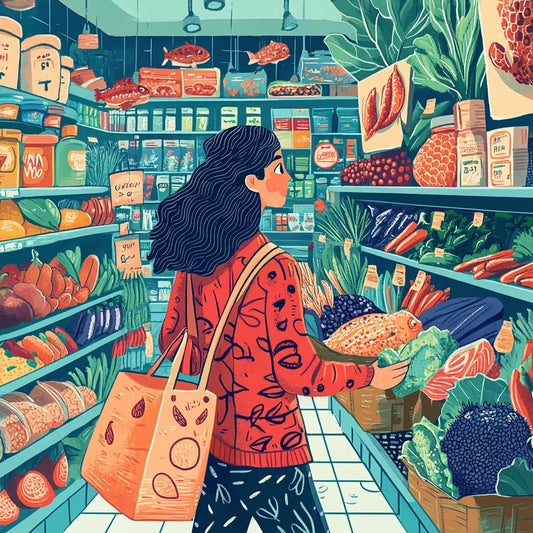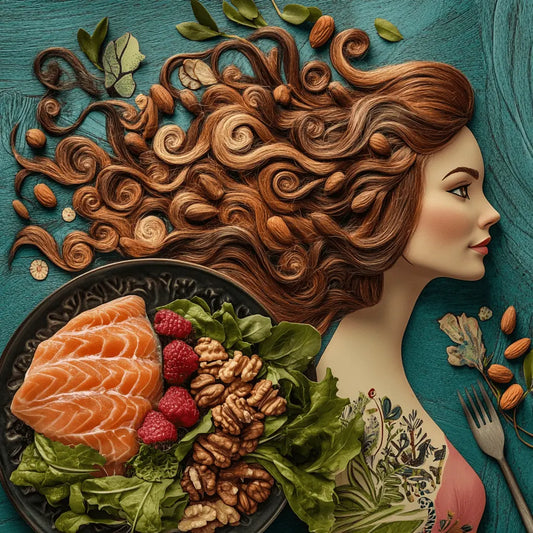Why isn’t your hair as strong or shiny as it used to be? The answer may lie in your diet. While hair care products can help from the outside, what you eat has a big impact on your hair’s growth, strength, and overall appearance. Our hair needs the right nutrients to thrive, just like any other part of our body. In this article, we’ll discuss how a balanced diet can help your hair grow, protect it from breakage, and help keep it in top condition. We’ll also offer practical meal plans packed with the nutrients your hair craves, so you can start seeing results quickly.
Chapter 1: The Connection Between Diet and Hair Health
The connection between your diet and hair health is often underestimated. Just like your skin and nails, your hair is a reflection of your inner health. Your hair needs a constant supply of nutrients – protein, vitamins and minerals – to promote growth and strength. When your diet lacks essential nutrients, it can lead to thinning hair, breakage and even hair loss. Studies show that a balanced diet can make a huge difference. For example, iron deficiency is often linked to excessive hair loss, while a lack of omega-3 fatty acids can lead to dry, brittle hair.
Key nutrients for healthy hair
The health of your hair depends on:
- Protein: They provide the building blocks for keratin, the structural protein that makes up your hair.
- Vitamins: Especially vitamins A, D, E and biotin, which help with hair cell production and strength.
- Minerals: Iron, zinc, and selenium promote hair growth and maintain scalp health.
- Healthy fats: Omega-3 acids keep the scalp moisturized, reducing hair breakage.
By including these nutrients in your daily meals, you can improve hair growth, strength, and shine from the inside out.

Chapter 2: Macronutrient Ratios for Healthy Hair
Your body needs a balanced mix of macronutrients—protein, fat, and carbohydrates—to support healthy hair growth. These nutrients not only nourish your hair, but also provide energy to your hair follicles, promoting hair growth and reducing hair loss.
Protein: essential for hair growth
Protein is essential for hair because it forms keratin, which strengthens the hair shaft and protects it from breakage. If you don't get enough protein, your hair can become weak, brittle, and may stop growing altogether.
- Interesting fact: Hair is made up of as much as 95% keratin , which is essential for strong, healthy hair.
- Recommended sources: Lean meats, poultry, eggs, dairy products, legumes, and plant-based proteins like quinoa and chickpeas are great choices for increasing your protein intake.

Healthy fats: omega-3 acids for scalp moisture
Healthy fats, especially omega-3 fatty acids, play an important role in keeping your scalp moisturized. A dry scalp can cause dandruff and slow hair growth, and well-hydrated roots are essential for maintaining healthy hair.
- Interesting statistic: Studies show that a diet rich in omega-3 fatty acids can reduce hair breakage by up to 40%.
- Best sources: Salmon, flax seeds, chia seeds, walnuts, and avocados are all great sources of omega-3s that help support a balanced diet.
Complex carbohydrates for vitamin absorption
Carbohydrates provide your body with energy, and complex carbohydrates in particular help your body absorb vitamins essential for hair growth, such as biotin, folic acid, and vitamin C. These vitamins stimulate the production of hair cells and prevent premature hair loss.
- Did you know? A diet low in complex carbohydrates can cause a lack of energy in hair follicles, slowing hair growth.
- Best sources: Whole grains like oats, quinoa, brown rice, and vegetables like sweet potatoes and squash provide a healthy dose of complex carbohydrates.
Chapter 3: Daily Meal Plans for Optimal Hair Growth
Creating a hair-friendly diet doesn't have to be complicated. Here's how you can plan your meals to ensure you're getting the essential nutrients you need for strong, healthy hair.
Breakfast
Breakfast is the most important meal of the day, providing your body with the nutrients it needs. Focus on protein, omega-3s, and antioxidants, which will help promote hair growth throughout the day.

- Example 1: Greek yogurt with berries, chia seeds, and honey
- Nutrients: Protein, antioxidants, omega-3
- Benefits: Greek yogurt is a great source of protein, and berries are rich in vitamin C and antioxidants, which boost collagen production in the scalp.
- Example 2: Scrambled eggs with spinach and whole grain toast
- Nutrients: Protein, iron, biotin
- Benefits: Eggs are rich in biotin and protein, which are essential for keratin production. Spinach is rich in iron, which improves oxygen supply to hair follicles.
- Example 3: Avocado toast with smoked salmon and pumpkin seeds
- Nutrients: Omega-3, protein, zinc
- Benefits: Avocados and salmon provide healthy fats, while pumpkin seeds provide zinc, which is important for a healthy scalp.
Lunch
Lunch should focus on lean protein, healthy fat, and vegetable sources to keep your hair healthy throughout the day.

- Example 1: Quinoa salad with chickpeas, roasted vegetables and olive oil
- Nutrients: Protein, iron, vitamin E
- Benefits: Quinoa and chickpeas provide plant-based protein, while olive oil provides vitamin E, which helps repair hair damage.
- Example 2: Turkey and avocado wrap with salad
- Nutrients: Lean protein, healthy fats, vitamins A and E
- Benefits: Turkey is a great source of lean protein, and avocados provide healthy fats that nourish the scalp.
- Example 3: Grilled chicken breast with vegetables and olive oil
- Nutrients: Protein, biotin, iron
- Benefits: This dish provides the necessary amount of protein and iron, essential for hair strength and shine.
Dinner
For dinner, combine complex carbohydrates with lean protein and healthy fats to keep your hair nourished and recovering overnight.

- Example 1: Grilled salmon with sweet potatoes and steamed broccoli
- Nutrients: Omega-3, Vitamin A, Biotin
- Benefits: Salmon provides omega-3 fatty acids, and sweet potatoes provide vitamin A, which is important for the production of sebum, which keeps hair moisturized.
- Example 2: Lentil curry with brown rice and spinach
- Nutrients: Plant protein, iron, folic acid
- Benefits: Lentils are rich in iron and protein, while spinach provides folic acid, which promotes hair growth.
- Example 3: Tofu with mixed vegetables and quinoa
- Nutrients: Protein, zinc, omega-3
- Benefits: Tofu and quinoa provide essential doses of protein and zinc, promoting a healthy scalp and stronger hair.
Chapter 4: Conclusion – The role of a balanced diet in hair growth
A balanced diet is an important factor in maintaining strong, healthy hair. By ensuring you consume the right amount of protein, healthy fats, and complex carbohydrates, you can prevent hair loss, promote hair growth, and improve the overall condition of your hair. Remember, changes won’t happen overnight, but consistency and the right food choices will bring visible results. Start by incorporating the meal plans in this article into your diet and enjoy stronger, shinier, and healthier hair.

Myth debunking or interesting facts
- Myth: Only expensive hair products can promote hair growth.
Fact: Nutrition plays a huge role in hair health. A protein-rich diet can promote hair growth just as effectively as some hair products. - Fun fact: People who follow a Mediterranean diet experience 20% less hair loss due to their high intake of omega-3s and antioxidants.
- Myth: Cutting out carbs is a great solution for hair growth.
Fact: Your hair needs complex carbohydrates to help absorb vitamins like biotin, which are essential for strong hair. - Interesting fact: Iron deficiency is associated with 30% of cases of unexplained hair loss in women under 50.
- Myth: Oil makes hair greasy and unhealthy.
Fact: Healthy fats like omega-3s nourish the scalp and prevent hair breakage.

Practical tips or solutions
- Eat more protein: Include lean meats, eggs, tofu, and legumes in your diet to support keratin production.
- Include more omega-3 rich foods: Add salmon, flaxseeds, and walnuts to keep your scalp moisturized and your hair strong.
- Increase your iron intake: Spinach, lentils, and fortified cereals are excellent sources of iron, which helps prevent hair thinning.
- Focus on antioxidants: Berries, nuts, and dark green leafy vegetables are rich in antioxidants that protect your hair from damage.
- Drink enough water: Drink plenty of water throughout the day to maintain a healthy scalp and prevent dry, brittle hair.

Frequently asked questions
- Can my diet really affect hair growth?
Yes, a diet rich in proteins, vitamins, and healthy fats is essential for healthy hair growth. - When can I expect results after diet changes?
Hair growth is a slow process, but after 3-6 months you should start to notice healthier, stronger hair. - What is the best food for hair growth?
Protein-rich foods like eggs and fish, along with leafy vegetables and nuts, are great for promoting hair growth. - Can giving up carbs harm my hair?
Yes, complex carbohydrates help absorb vital vitamins like biotin and folic acid, which are essential for healthy hair. - Does drinking water help my hair?
Of course! Hydration is the key to a healthy scalp, which is essential for hair growth.
